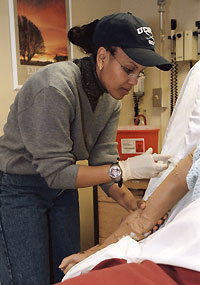For more archives, go to the Advance Archive/Search Page.
New Program Puts Students On
Fast Track To Nursing Careers
Michelle Moody was a program coordinator for a church. Joseph Taliercio taught in a middle school. Diane Soderlund did ballistic analysis in a crime lab.

|
|
Asmait Yohannes, a student in the new nursing master's-level entry program, practices using a syringe on a mannequin.
Photo by Jordan Bender
|
The three are among 31 people from a variety of occupations who are now enrolled in UConn's Master's Entry into Nursing program, a full-time accelerated program aimed at helping ease the state's nursing shortage. The 45-credit program takes 12 months to complete and is geared for those who hold a bachelor's degree or higher, in a field other than nursing. It culminates in a certificate that allows students to take the licensing exam in Connecticut and enroll in the master's program in nursing at UConn.
"The nursing shortage is huge," says Carol Polifroni, an associate professor of nursing who is director of the program. "It is projected by the U.S. Department of Labor that by 2020, there will be 29 percent too few nurses in the nation. That translates into 800,000 people. In Connecticut, the shortage is expected to be 15,000 too few nurses by 2010."
Those who have entered the program range in age from early 20's to 50's, and have earned undergraduate degrees in a variety of fields. One student has a doctorate in ethics, another has one in genetics. And, although the national average for male nurses is less than 4 percent, says Polifroni, nearly a third of the program's participants are men.
"They are a remarkable group of students, who bring their life experiences to the program," says Laura Dzurec, dean of the School of Nursing.
Polifroni says these more mature students have "fewer hurdles to overcome" than the traditional undergraduates. "They tend to be more focused," she says, "and more comfortable talking to people. And, although they may have significantly more responsibilit ies - with families and children in some instances - they're able to dedicate themselves to the discipline."
The School of Nursing recently received a $300,000 gift from the Paul L. Jones Fund to establish scholarships for the fast-track nursing education program. "Their support of this important initiative will increase the number of highly skilled nurses we put in the field," Dzurec says.
Moody had thought about going to medical school after earning a bachelor's degree in biology from UMass in 1996. "But at the time, I wasn't ready," she says. Instead, she chose to work as a program organizer in a church. "My faith and religion are strong, and drove me at that point to help people at the spiritual level, rather than the medical," she says.
When she was laid off in August, she became an EMT for Newington Volunteer Ambulance, and started looking at medical schools and nursing programs. She decided on the accelerated master's program at UConn. "The price was right, and you could be an RN in one year," she says. "That's amazing."
Nursing is the right path for her, she says: "I like that I can combine my spirituality and clinical skills."
Cheryl Tyler has a bachelor's degree in health science with a minor in business from the University of Hartford. She graduated from the accelerated nursing program in December, and is now a registered nurse at Windham Hospital.
"The program was very intense clinical-wise," she says. "In any other program, there would have been a lot more book work, and I would have been repeating a lot of the classes I'd already taken as an undergraduate."
Soderlund, who earned a bachelor's degree in biology from St. Joseph College in 1999, says that at age 27, "I've realized that this is where I should have been all along. With age comes a level of maturity that this profession needs."
Taliercio, 24, who has a bachelor's degree in biology and computer science, says he likes the mix of students in the group. "Some have a ton of work experience and are in their 30's and 40's," he says.
He also appreciates the time he gets to spend with patients as part of the program: "It's really great.
You have contact with patients in the first week, so you know right away whether you're going to like it or not."

